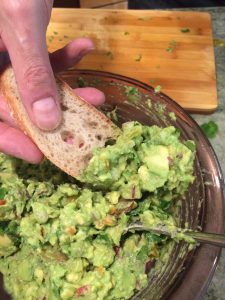The holidays are just around the corner, and we celebrate them by enjoying delicious treats. We don’t want to miss out on all of the festivities. But, unfortunately, the temptation can wreak havoc on your diet and fitness plan.
Temptations are everywhere!
First are the office parties, and then the treats everyone brings to share. They sit in the kitchen, tempting you whenever you need to refill your water or get a cup of coffee. They seem to call your name, even when you are not in the room.
You cook an elaborate meal for your family, but you have to taste everything before serving it. So you’re already full when you sit down at the table, but you still have to eat with the rest of the family! Then you visit friends and don’t want to disappoint them, so you at least try all of the delicacies they made.

Your waistline is already growing, and the pants are getting tighter. On top of that, you feel lethargic because of all the sugar, fat, and extra alcohol, and to top it all off, you are not exercising as much as you normally do.
Oh no, it’s happening. Another Year. Another Diet. Another Disappointment.
Already you feel guilty and disappointed about your lack of self-control. You think, “Darn it, there goes some of the milestones I reached!” You almost lost all the weight you planned to lose at the beginning of the year. You had your nutrition and exercise program under control…until now. Thinking that, okay, another year, another diet, and hopefully, you can get in shape fast.
But wait, you notice that “help” is on the way everywhere you look. You read about these “quick weight loss” programs: the bulletproof diet and the juice cleanses. These diets offer to shock your system into losing the weight you gained during the holidays. Your friend offers to sign you up for her diet group. Phew saved, and you continue eating.
You know that this coming year it will work, right?! So this year, you keep to all those crazy rules. You hope that the diet you picked will work for you and get that weight off quickly.
The Problem With The Diet Culture!
Diet culture promotes a problematic relationship between food and body image, with several key issues:
- Promotion of Unrealistic Body Standards: Diet culture often glorifies thinness and suggests it’s synonymous with health and happiness, which can lead to unhealthy body image and behaviors.
- Short-Term Focus: Many diet culture messages promote quick fixes or fad diets that may lead to temporary weight loss but aren’t sustainable or healthy in the long term. This often results in yo-yo dieting, which can harm both physical and mental health.
- Disordered Eating: The constant focus on food restriction and weight can contribute to the development of eating disorders and other mental health issues such as anxiety and depression.
- Overemphasis on Physical Appearance: Diet culture places a disproportionate focus on how bodies look over how they feel or what they can do. This can lead to a neglect of overall well-being, including aspects like mental and emotional health.
- Food Guilt: Diet culture often labels certain foods as ‘good’ or ‘bad’, leading to feelings of guilt or shame when ‘bad’ foods are consumed. This can create an unhealthy relationship with food and eating.
- Ignoring Individual Needs: Diet culture promotes a one-size-fits-all approach, overlooking the fact that everyone’s nutritional needs and preferences are different. This can lead to inadequate nutrient intake and dissatisfaction with eating.
It’s important to advocate for a shift from a diet culture to a more balanced approach, emphasizing overall health, individual nutritional needs, and a positive relationship with food and body.
Do you know what I am saying? Stop dieting!
Stop feeling like a failure because you can’t stick with them. Don’t try another fad diet and be disappointed yet again.
But wait, take a minute and ask yourself:
What if there was a better way than dieting?
What if I didn’t have to feel guilty during the holidays?
What if you did not set yourself up for disappointment each and every year?
I am not saying throw caution to the wind and go for it. Instead, I suggest solutions to change unhealthy thinking habits and take control of your life and the holidays.
3 Ways To Take Control and Stop Dieting!
# 1 Gauge your desire
Don’t just go for it. Wait a moment and think about what you will put into your body. Get a clear idea of how important the food is to your health. Ask yourself: Why am I eating this? Is it good for my body? Does it give me energy?
# 2 Assess your brain message

Is your brain telling you that you can’t live without eating this treat? Are those urges and impulses real dietary needs?
The brain plays tricks on us regarding smell and specific food colors (shades of red signal your brain to eat, it’s why all those fast food places you love are painted red/orange/yellow!) So stop before you follow your brain. Slow down and assess what you’re about to eat (and eat in moderation!). You know what you are doing if you really think about it.
# 3 Refocus your attention
Redirect your focus on healthy nutrition patterns. Focus on wholesome and productive activities, despite false urges. Make the best choices you can, given the situation you are in. For example, focus on how delicious a salad, dressing on the side, tastes and its satisfying crunch.
You may not make the perfect choices during the holidays, and that’s okay. But you don’t need to feel deprived or disappointed at the end of December.
No need to try another crash diet at the beginning of the year. You will not feel disappointed about your lack of self-control because you chose what is good for you. You owned it, and you earned it.
Give Yourself Grace and Kindness
Giving yourself grace when you’ve fallen off the healthy eating wagon is essential for maintaining a positive relationship with food and yourself. Here are some tips to help you do so:
- Practice Self-Compassion: Remember that everyone has slip-ups, and it’s a normal part of the journey. Treat yourself with kindness and understanding, just as you would with a friend who made a mistake.
- Avoid Guilt and Shame: Instead of dwelling on what you perceive as a failure, acknowledge that it’s just one moment and doesn’t define your overall progress or worth. Guilt and shame can lead to a negative cycle, making it harder to get back on track.
- Focus on the Present: Shift your focus to the present moment and make choices that align with your goals. Rather than dwelling on past slip-ups, make conscious choices that support your well-being moving forward.
- Reframe Your Mindset: Instead of viewing healthy eating as an all-or-nothing endeavor, adopt a more flexible mindset. Understand that balance is key; occasional deviations from your usual eating habits won’t undo all your progress.
- Learn from the Experience: Use the setback as an opportunity for growth and self-reflection. Identify any triggers or challenges that contributed to falling off track, and brainstorm strategies to overcome them in the future.
- Seek Support: Surrounding yourself with a positive support system can significantly impact your journey toward healthy eating.
Remember, giving yourself grace and practicing self-compassion allows you to approach healthy eating with a positive mindset, making it easier to get back on track and maintain a balanced relationship with food.
Stop the diet trap and start something sustainable for life! I invite you to take a look at the Pursue Your Spark Blueprint right here.


Pingback: top 3 nutrition tips through menopause and beyond
Comments are closed.